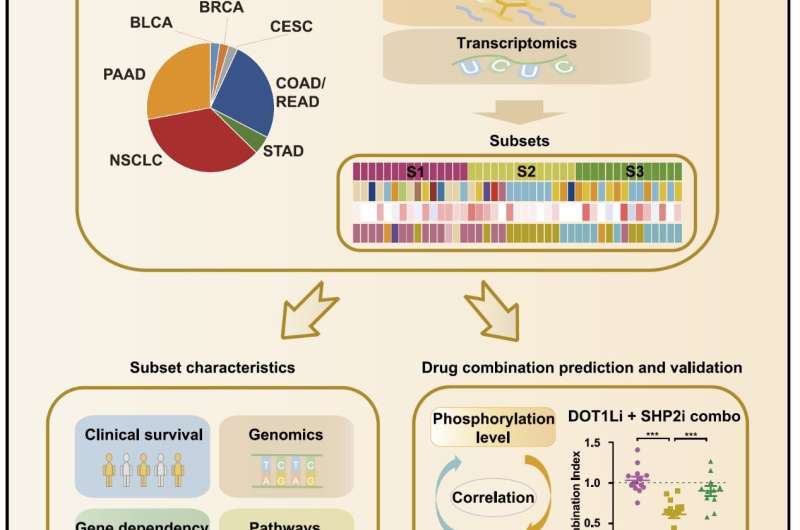Researchers reveal molecular subtypes and new precise therapy for KRAS mutant cancers

KRAS protein serves as an on/off molecular switch to relay signals from outside the cell to the cell nucleus. When the gene is mutated, KRAS will be continuously activated to promote the initiation and progression of cancers. It is one of the most commonly mutated genes, which approximately presents in 20% of all human cancers.
A team of researchers led by Tan Minjia and Huang Min from the Shanghai Institute of Materia Medica (SIMM) of the Chinese Academy of Sciences revealed new molecular subtypes of KRAS mutant cancer and identified new precise therapy. The study was published in Molecular Cell on August 9.
The researchers conducted a large-scale proteomic and phosphoproteomic analysis of 43 KRAS mutant cancer cell lines across different tissue origins, and identified three molecular subsets of KRAS mutant cancers with distinct biological characteristics.
"The subtyping result is useful to molecularly classify the large cohort of KRAS mutant clinical samples. Prognosis among the three subsets of clinical samples could be effectively distinguished, which demonstrated the potential clinical utility of the subtyping result," said Tan, the corresponding author of the study.
The researchers also investigated the subset-specific drugs, drug sensitivity biomarkers, and potential therapeutic targets, and developed a new method to predict the synergistic effects of drug combinations based on the integrative analysis of phosphoproteome and drug sensitivity information. This analysis led to the identification of a set of drug combinations with therapeutic potentials.
Among these drug combinations, they further demonstrated that the combined inhibition of the histone methyltransferase DOT1L and phosphatase SHP2 was an effective treatment for a subset of KRAS mutant cancer, corresponding to the clinical tumors with poorest prognosis.
This study provides a comprehensive proteomic and phosphoproteomic landscape of KRAS mutant cancers, inspiring a better understanding of the molecular characteristics of KRAS mutant cancer and new therapeutic possibilities.
More information: Zhiwei Liu et al, A proteomic and phosphoproteomic landscape of KRAS mutant cancers identifies combination therapies, Molecular Cell (2021). DOI: 10.1016/j.molcel.2021.07.021
Journal information: Molecular Cell
Provided by Chinese Academy of Sciences




















